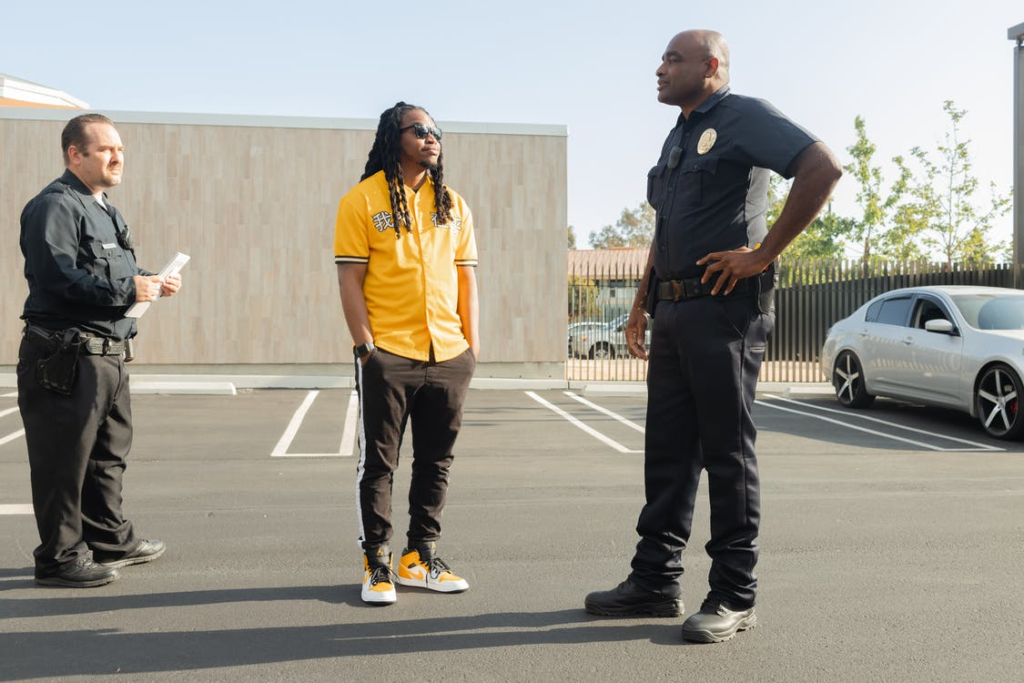The question of how to keep our police officers accountable has been a hot topic in the media these days. Stories of cops abusing their powers or using too much force in enacting their duties are all too common. Concerned citizens want to know what they can do to help keep those charged with keeping us safe from taking a step too far.
What are your options as a concerned member of the public? If you see an on-duty police officer committing an offence, can you arrest a cop?
Technically you can arrest a cop.
Police officers are people under the law, just like you and me. They are governed by the same set of rules as everyone else. The law does not make a legal distinction between any person, no matter their position in the police department or any other office of government or the court.
And that set of rules still applies when a cop puts on their uniform.
So, technically a member of the public could arrest a cop, using a process called a citizen’s arrest. A citizen’s arrest isn’t just something out of the movies, it’s a legitimate right laid out in the Criminal Code of Canada.
As is the case with any citizen’s arrest, you’ll want to be very sure what you’ve witnessed is actually an indictable offence. A citizen’s arrest can only be used in very specific situations and comes with some very clear limitations. If you plan on placing a police officer, or any person for that matter, under citizen’s arrest, you better be very confident in what you’ve witnessed.
If you end up using too much force or mistake someone’s actions as illegal, you could very easily infringe that person’s rights and find yourself in a bit of hot water.

What is a Citizen’s Arrest?
The concept of the citizen’s arrest has a long history in the common law of many modern western democracies, including the United States, the United Kingdom and Canada. In many of these countries including Canada, the UK and many American states, this common law has been codified into law.
In Canada, a Citizen’s Arrest is a right guaranteed under section 494 of the Canadian Criminal Code. This section of the act guarantees any person’s right to arrest without a warrant, but only if a specific set of criteria is met.
First off, anyone can arrest a person they’ve witnessed committing an indictable offence. Furthermore, private citizens can arrest an individual they believe, on reasonable grounds, has committed an offence and has been recently pursued by someone with the legal authority to arrest, i.e. a peace officer.
There is also a provision noted specifically for property owners. A property owner or an individual authorized by the property owner can arrest a person they find committing an offence in relation to that property, either at the time of the offence or within a reasonable time frame afterward. It’s important to note that proper authorities should be contacted to make the arrest if at all possible.
This section of the code also stresses that a person arrested without a warrant by members of the public should be turned over to a peace officer as soon as possible.
But, What About the Cops?
As we mentioned above, cops are members of the public and just as liable under the law as anyone else, even when they are on duty and in uniform.
The decision to place someone under a citizen’s arrest shouldn’t be taken lightly in any case, not least of all for members of the police force. Again, if you aren’t 100% correct that someone has committed an offence, a citizen’s arrest could easily turn into an assault or harassment charge for you. There are numerous examples where a Citizen’s Arrest is cited amid charges of excessive use of force and illegal detainment. A private citizen should only consider a citizen’s arrest if there is no peace officer readily available to make the arrest.
If it’s a police officer that has committed an alleged crime, an even further degree of caution is recommended.
Peace officers in Canada are given a great deal of discretionary power when it comes to fulfilling their duties. Attempting an arrest on a cop is problematic and potentially dangerous. Keep in mind that both assaulting a police officer and obstructing an officer’s ability to enforce the law are serious offences.
A much safer route to take would be to carefully document the officer’s conduct – record all pertinent information including the officer’s badge number and ask for the officer’s superior officer or supervisor. Once this is done, you can lodge a formal complaint. Police departments take this kind of complaint very seriously and have special departments dedicated to investigating them.

Has a Private Citizen Ever Arrested a Cop?
In recent news, members of a QAnon-inspired far-right group attempted a citizen’s arrest of police officers in Peterborough, Ontario.
Leaders of the Canadian QAnon group encouraged followers to arrest members of the Peterborough Police on Saturday, August 13th of this year. Three members of the alt-right group were ultimately arrested and charged with two counts of assaulting a police officer after attempting what they described as a citizen’s arrest.
The above may be an extreme example, but it shows how attempting an arrest on a police officer can quickly escalate into serious charges for those attempting the arrest.
Arrest a cop in Canada Conclusion
There are many cases that cite a citizen’s arrest as a defence, but no cases of a private citizen legitimately arresting a member of law enforcement.
The concept of a citizen’s arrest has a long history and is entrenched in the Canadian Criminal Code. It clearly lays out a private citizen’s right to arrest a person they witness committing a crime or they reasonably believe has committed a crime.
A police officer as a Canadian citizen is equally culpable in the eyes of the law as anyone else committing a crime. While it may be technically legal and possible to arrest a police officer, all other alternatives should be thoroughly explored for your own safety. It’s better to let the police take care of their own.
We hope you found this guide on how you can arrest a cop in Canada helpful. We don’t suggest you try it!


